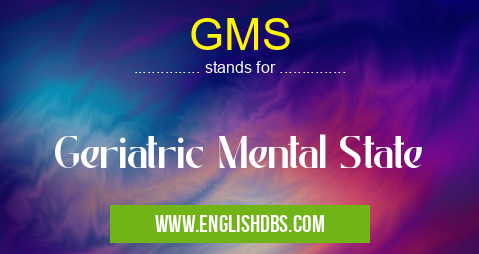What does GMS mean in GERIATRIC
Geriatric Mental State (GMS) is a structured clinical interview designed to assess the mental health of older adults. It provides a comprehensive evaluation of cognitive, affective, and behavioral aspects of mental functioning. GMS is widely used in geriatric psychiatry, research, and clinical practice.

GMS meaning in Geriatric in Medical
GMS mostly used in an acronym Geriatric in Category Medical that means Geriatric Mental State
Shorthand: GMS,
Full Form: Geriatric Mental State
For more information of "Geriatric Mental State", see the section below.
GMS: Definition and Purpose
Assessment Areas
GMS covers a broad range of mental health domains, including:
- Cognitive functioning: Memory, attention, language, and problem-solving abilities
- Mood and affect: Depression, anxiety, and irritability
- Behavioral disturbances: Agitation, aggression, and sleep difficulties
- Physical health: Medical conditions and functional limitations
- Social functioning: Relationships, support systems, and daily activities
Administration
GMS is typically administered by a trained clinician in a semi-structured interview format. The interview involves asking specific questions, observing the patient's behavior, and rating their responses on a scale.
Interpretation
The results of a GMS assessment can help clinicians diagnose mental health disorders, assess treatment response, and monitor changes in mental functioning over time. GMS scores can also be used to predict cognitive decline and functional impairments in older adults.
Conclusion
GMS is a valuable tool for assessing the mental health of older adults. It provides a comprehensive evaluation of cognitive, affective, and behavioral aspects of mental functioning, helping clinicians make informed decisions about diagnosis, treatment, and care planning.
Essential Questions and Answers on Geriatric Mental State in "MEDICAL»GERIATRIC"
What is the Geriatric Mental State (GMS)?
The Geriatric Mental State (GMS) is a structured psychiatric interview designed to assess mental health in older adults. It evaluates a range of cognitive, emotional, and behavioral symptoms commonly associated with aging and mental illness.
What are the key areas covered by the GMS?
The GMS addresses various aspects of mental health, including:
- Cognitive function (e.g., orientation, memory, attention)
- Mood and affect (e.g., depression, anxiety)
- Behavior and conduct (e.g., agitation, hallucinations)
- Physical health and well-being
- Social and environmental factors
How is the GMS administered?
The GMS is conducted by a trained healthcare professional, typically a psychiatrist, psychologist, or social worker. It involves a series of questions and observations made during a face-to-face interview.
What is the purpose of the GMS?
The GMS is used to:
- Diagnose mental health conditions
- Monitor treatment progress
- Plan appropriate interventions
- Screen for cognitive impairment and dementia
Who benefits from the GMS?
The GMS is particularly beneficial for older adults who may be experiencing mental health concerns, including those with:
- Memory loss
- Difficulty concentrating
- Changes in mood or behavior
- Suspected dementia or other cognitive impairment
GMS also stands for: |
|
| All stands for GMS |
